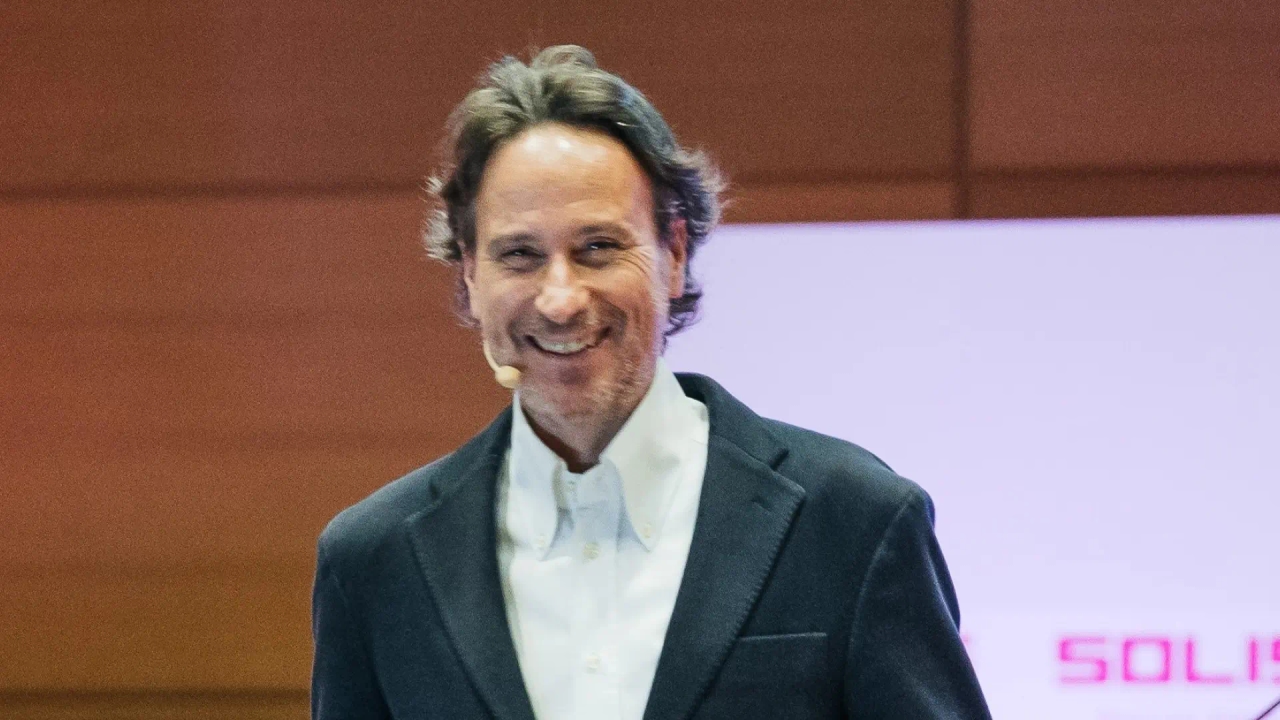Interview with Víctor Küppers, positive psychology expert: "Everyone is born with the potential to be a good person, but many become bad."

Víctor Küppers fills the halls where he shares his famous talks, based on his own experience and the fundamental pillars of the positive psychology he speaks about. He's an excellent communicator, there's no doubt about it, and every time he takes the stage, his zest for life and sharing with others is contagious. Concepts such as the need to be good people, beyond intelligence (which is a virtue we're born with, or not), to help others, to be polite, and capable of making life more pleasant for others are repeated time and again in his presentations.
And that's what it's all about, repeating concepts until we internalize them. As he himself tells us: " I'm not an expert in anything, I'm not a very intelligent person. I read everything I can get my hands on about positive psychology, I study the experts, and I simply pass on their ideas. They give me more credit than I deserve... but I only explain things we all know and need to remember . Easy work. The real merit is in applying it, and in that, I'm a beginner every day; I'm not an expert at all."
What's a consultant doing giving positive psychology talks to thousands of people?When asked how Víctor Küppers ended up in this new life, from stage to stage, and from motivational talk to talk for thousands of people, the expert (we do consider him to be one, and very much so, despite his humility) begins by explaining that his "is not an interesting story , but the truth is that in this new beginning I was lucky."
To put us in perspective on her personal life, Küppers adds: "I used to work in consulting. I liked it, but I didn't realize it was a very demanding job that involved spending a lot of time away from home. I had an accident in 2023 , and that's when I discovered I had two fabulous children. After six months in bed, I returned to work and told my boss I wanted to earn less and take school holidays to spend as much time with my children as possible."
Well, when faced with such a proposal, Küppers received a resounding 'no'. "They told me to grow up, and so I decided to work for myself, the only way I could spend all my vacations with my children. I've always been passionate about reading books about attitude and personal development . I wrote an article during my sick leave, got it published, and a car company read it. From there, they asked me to do a session for their team. And I did. That's how it all began."
"There are many intelligent people in this society, but we also need them to be good."One of the key points in Victor's speech refers to kindness, as an absolute concept. We could say that everything he proposes stems from this idea, that it is the foundation on which the way he invites us to live pivots. " Intelligence is important , of course; there is nothing worse than a motivated fool. But it's not the only thing we should value and admire. After all , intelligence belongs to you; you haven't done anything to deserve it. However, being a good person is a personal endeavor, a daily effort, which is why I think it has more merit."
And he goes on to argue that "there are many intelligent people in this society, but we also need them to be good, to put their intelligence at the service of others , to use it to improve society, to make it more humane, more just. It's sad to look up and see in whose hands we are on this planet. Perhaps many of them are very intelligent, but they don't put their abilities at the service of others to try to improve the world."
"If the ten most important leaders were to agree, hunger, wars, and the perverse lack of solidarity with the Third World would immediately end. But these are impractical approaches; each person is responsible for the space in which they live and must strive to make theirs as human a world as possible."
"Let no one ever come near you without leaving feeling a little better and happier."Paraphrasing Mother Teresa of Calcutta, Küppers fully agrees with this phrase she made famous: "Let no one ever come near you without leaving feeling a little better and happier." Along these lines, and when asked whether there are good guys and bad guys, like in Western movies, the expert comments that "philosophers have discussed this a lot, and I'm not going to be the one to have the answer."
However, "if you ask me for my personal opinion, I think everyone is born with the potential to be a good person , but many undoubtedly become bad people. And I have no doubt that good people are much happier. In fact, I think that the great objective that we human beings have in this life is to fight every day to try to be a good person, to help others and make their lives more pleasant. There is nothing greater to which one can aspire."
"Motivation is important to get started, but willpower is essential to achieve it."Küppers talks a lot about the repetition of certain concepts that, through repeated repetition, eventually become internalized. In this regard, he believes that "experts always explain that the brain is plastic. The neuroplasticity of this vital organ means we can eliminate habits and also create new ones. It's a matter of repetition, and willpower is essential for that."
A lot of importance is placed on motivation, "and it certainly is; motivation is important to get started, but willpower is essential to get there. That's why I believe willpower should take precedence over motivation. And this is where the problem arises. Why do I say this? Because we want everything quickly, easily, without effort. Willpower is hard, but it goes beyond intelligence or motivation."
"Accepting that life has adversities does not mean resigning yourself to it."In life, we all know that adversity exists; it's inevitable. "Life sometimes isn't pretty, it's unfair, sometimes it can even be downright cruel and unbearable. But there are two kinds of problems: dramas and those that are just annoying circumstances. When faced with the latter, we have the right to be angry, to vent our anger justly and necessary, of course. But then, we have to accept that things are the way they are, that not everything is in our hands, and that acceptance is a sign of maturity. In life, not everything is pretty, of course not!"
Of course, the expert makes a key distinction between acceptance and conformity. "Accepting adversity in no way means resigning yourself. Not at all. After accepting what has happened to us, we must ask ourselves, 'Given this situation that I don't like, what can I do? What is in my power to improve it?' Falling into constant complaining blocks us, takes away our joy, and on top of that, it won't change reality. We all go through uncomfortable and unpleasant situations, but they are tunnels, not wells, and you get out of tunnels if you keep walking. In life, there is a time to get angry, but there is another time to get up and move forward ."
The positivism Küppers embraces isn't superficial at all; she's not just talking about being "happy" for the sake of it. "When a tragedy happens, like a death, an illness, being unemployed, or any painful situation, suffering is inevitable. But time, the company of people who love us, and faith are the three things that help us cope. Those of us who aren't experiencing tragedy at the moment need to help those who are . We're in this life to help each other; it's not worth looking the other way."
20minutos




